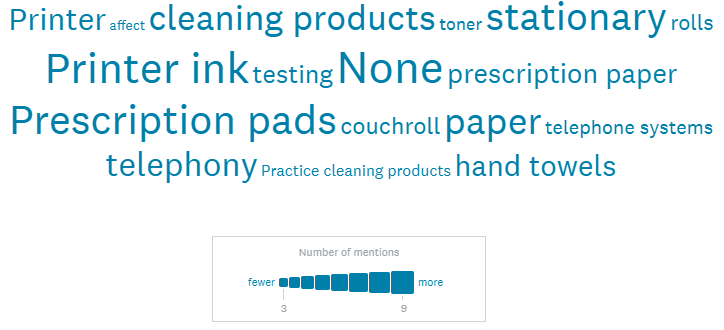EU Exit Planning: Non-Clinical Goods and Services
![]() Thank you for responding to our recent survey on practice needs in the event of a no-deal Brexit. We rely on your input.
Thank you for responding to our recent survey on practice needs in the event of a no-deal Brexit. We rely on your input.
Following a discussion at our Annual General Meeting on Thursday 24 January, we asked you about the impact of a no-deal EU exit on your practice-critical Non-Clinical Goods and Services (NCGS). Medical devices, clinical consumables and medicines are being considered separately.
We asked you to consider:
- The dependency of those goods/ services on that front-line service;
- The criticality of that front-line service and its clinical importance; and
- Outsourced services such as equipment maintenance.
We had a really good response and have been able to advise officials about supply concerns across London in good time. Whilst there were a number of respondents who are unconcerned about the impact of no-deal Brexit, those who do harbour concerns highlighted a number of non clinical products and services which they fear might be affected. These include:
- Stationary;
- Printer ink;
- Prescription pads;
- Couch roll;
- Paper;
- Telephony;
- Cleaning products;
- Prescription paper;
- Printer;
- Hand towels;
- Testing;
- Telephone systems;
- Practice cleaning products; and
- Toner.
We will continue to work with officials to identify and anticipate the impact of Brexit on London general practice, be it no-deal or otherwise. Other possible EU exit risks include:
- Goods or services that have supply chain touch points in the EU;
- Personal data held in EU member countries;
- Supply routes into the UK via Dover/ Calais; and
- Dependencies on EU regulations.
If you have any comments or questions about this work, please contact us.
This word cloud gives some indication of respondents' concerns.

Speakers' Corner - Virginia Patania - Keys to unlocking time (15 Mar 2016)
General Practice has never moved at a faster pace than it is now. Simply keeping up can take so much effort that the ‘day job’ can feel either as if...Londonwide LMCs' Annual Conference - Last 30 places (07 Mar 2016)
Londonwide Events ...Annual Report 2015/16 (19 Feb 2016)
Londonwide LMCs' Annual Report for 2015/16 is now available and downloadable on the links below: Annual Report 2015/16 Londonwide Local Medical Committees Ltd financial report...New GPC Guidance on the use of Patient Specific Directions and Patient Group Directions. (17 Feb 2016)
In response to regulatory changes, the GPC has issued updated guidance on the use of Patient Specific Directions (PSDs) and Patient Group Directions (PGDs) clearing up the confusion about...Training and development events update - February 2016 (17 Feb 2016)
Infection Control Update – 26 January 2016 This workshop proved very popular particularly amongst GPs or GPNs. We were only able to accommodate 32 delegates and the event was oversubscribed. ...It's election year at Londonwide LMCs! (17 Feb 2016)
Elections take place every two years on a rolling basis and any GP working in the area may be nominated for election. We welcome representation from all GPs including partners,...February 2016 newsletter now available (17 Feb 2016)
Londonwide LMCs NewsletterSpeakers’ Corner - practice manager Christian Jennings MBE on setting up a patient participation group. (17 Feb 2016)
This month Christian Jennings MBE, the practice manager for Camberwell Green Surgery, answers questions on how the practice got its patient participation group (PPG) up and running. Having an active PPG...Universities seeking stressed, burnt-out and depressed GPs. Can you help? (16 Feb 2016)
Despite doctors, including GPs, being more likely to experience reduced well-being and mental health symptoms, there is evidence that they also have insufficient access and face barriers to mainstream healthcare...Guidance
We provide expert guidance for practices in our guidance section, as well as an archive of other materials you may find useful.
GP Support
Contact our GP Support team if you need help or advice.
The team provide professional and pastoral support to GPs and practice teams on a broad range of issues.

